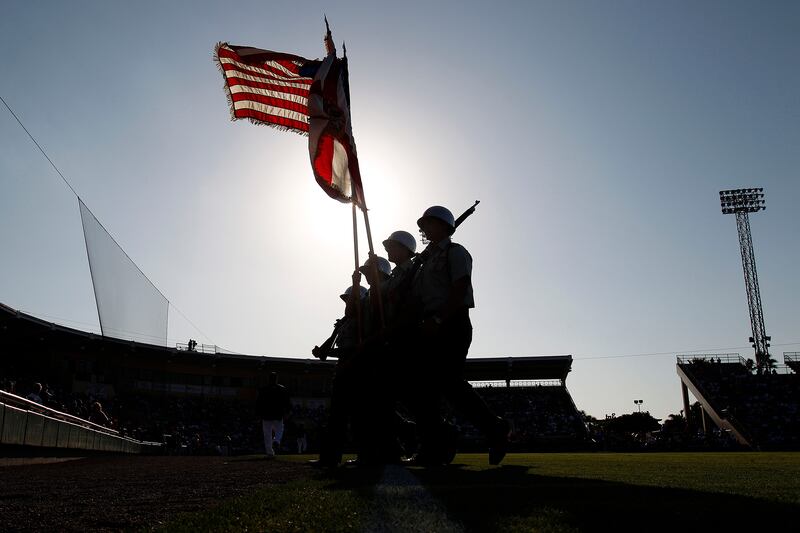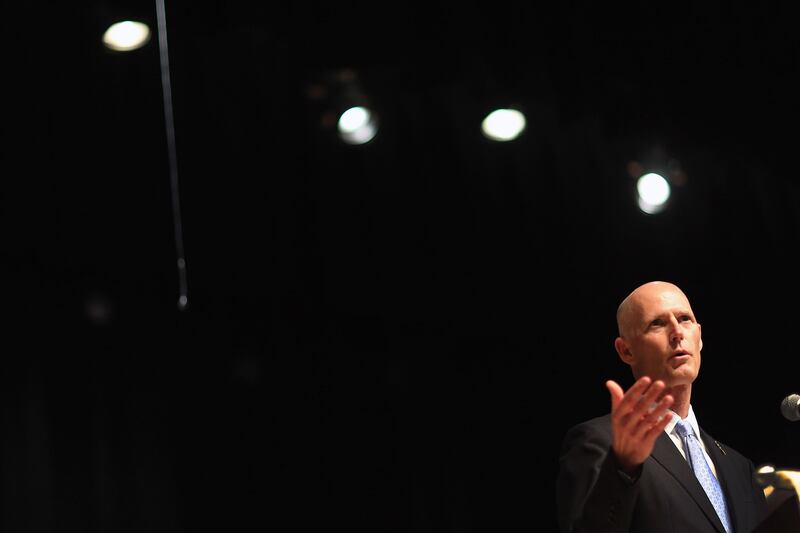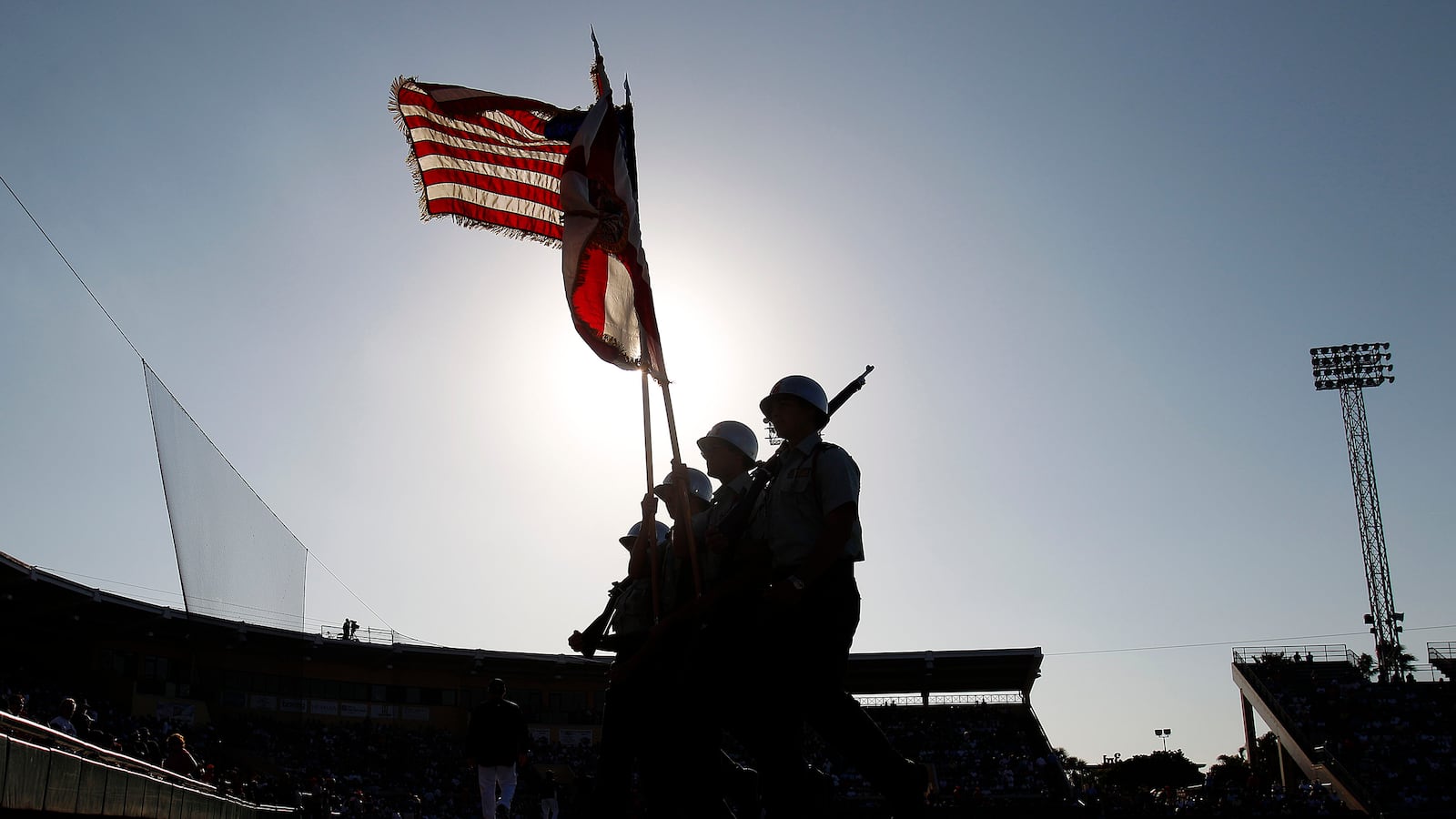With Tropical Storm Chantal headed for South Florida with landfall likely Saturday, Florida Gov. Rick Scott is sounding alarm bells about the impact of National Guard furloughs on state storm preparations. “The problem is you’re losing training time, you’re losing preparation time,” Scott said during a radio interview in Jacksonville. “When will the National Guard make the decision that we stop the furloughs? Right after the hurricane hits?”

Scott joined with two other Southern Republican governors whose states are in the path of tropical storms to write a letter to President Obama urging him to call off the furloughs. In Florida, nearly 1,000 employees of the National Guard are furloughed once a week, saving the federal government money under the congressionally mandated sequester but costing the state in readiness.
The letter, also signed by Louisiana Gov. Bobby Jindal and Mississippi Gov. Phil Bryant, says, “The furlough hits us at a historically inopportune time, as evidenced by many years of hurricanes, wildfires and flooding in our states from May through October.” The three governors point out that under sequestration, nearly 50 percent of their full-time uniformed military personnel will be furloughed one day a week from July through September.
The White House had no immediate response. So far, it has resisted calling for exceptions to sequestration and letting Congress take the lead. After members of Congress were inconvenienced traveling home and had to wait in long lines at the airport because TSA employees were affected, lawmakers immediately passed legislation to give TSA more flexibility on where to make cuts. Agriculture Secretary Tom Vilsack also won a reprieve for food inspectors in the wake of fierce lobbying from the meat industry.
Other agencies and constituents have hit back, noting that Congress has performed only when pressured by an elite group of travelers, but no other group has mustered the public outrage to force government action. Obama leaned on the Secret Service to restore public tours of the White House after a wave of bad publicity featuring disappointed schoolkids, but it’s not clear that waiving National Guard furloughs is within his power.

Republican lawmakers in the three affected states have generally championed sequestration, calling it a victory for fiscal prudence and criticizing the administration and Obama for predicting that it would have damaging results. Calls and emails to Florida Sen. Marco Rubio and Louisiana Sen. David Vitter were not returned. Rubio is on record saying that people in the real world are shocked by “politicians bellyaching over a 2 to 3 percent cut in spending” and that while the sequester is “not the best way” to cut spending, “it’s better than raising taxes as an alternative and it’s better than doing nothing.” Vitter has said the “so-called across the board cuts involved in this sequester is only 2.4 percent of the entire budget … Every family in Louisiana … has to deal with cuts to their budget that are far more serious than that on a regular basis, particularly in tough times …”
Mississippi Sen. Roger Wicker said Wednesday that “if we can’t absorb a 1.5 or 2 percent cut at the federal level, then shame on us,” and he’s not backing away from that, says his communications director Ryan Taylor. The senator wants the Defense Department to have the flexibility to make cuts where necessary but not interfere with readiness—a formula known more colloquially as having your cake and eating it too. “He has always said the government should do with less but wanted the administration to have the flexibility,” says Taylor.
Wicker clarified his position on the governors’ letter to Obama in a statement: “The furloughs being issued to members of the National Guard under sequestration come at a perilous time for those of us living in Gulf Coast states ... I support Governor Bryant’s request to exempt military technicians from DOD furloughs. These Guardsmen help ensure public safety and our ability to prepare for evacuations and the aftermath of these disasters.”
The House twice passed legislation to give the administration and particularly the Defense Department more flexibility in finding where to cut, but the measure failed to get the necessary 60 votes in the Senate. Democrats didn’t like the free pass it gave the Pentagon, and Republicans balked at handing the White House too much power.
Calls and emails to Louisiana Reps. Steve Scalise and Charles Boustany were not returned. Both have mocked the White House for exaggerating the potential harm from sequester. “If you believe President Obama’s Chicken Little impersonation, the sky will fall and American civilization will cease to exist. Fortunately, Americans know what’s going on here,” Scalise declared. Boustany echoed an idea that many came to believe, that talk of doomsday was overblown. “It's not going to be an issue. You're talking about cuts across a multitude of government programs,” he said.
Reviewing what these lawmakers have said about sequestration gets pretty repetitive: that it’s hard for the America people to believe that a 2 percent cut in government spending can really matter. That’s the argument Florida Rep. Steve Southerland made, and so far there’s no indication that he or any of the others will go to bat for their governors, who are in the path of a tropical storm and worried about their ability to withstand a natural disaster without the resources they need. That means Governor Scott is right when he suggests that the National Guard furloughs will be ended after the hurricane hits, when there’s no more saying the cuts don’t matter. Once a governor declares an emergency, the National Guard is called up and deployed as active military.






